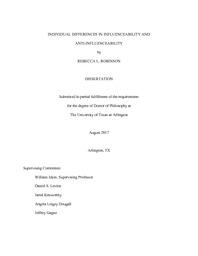
ATTENTION: The works hosted here are being migrated to a new repository that will consolidate resources, improve discoverability, and better show UTA's research impact on the global community. We will update authors as the migration progresses. Please see MavMatrix for more information.
Show simple item record
| dc.contributor.advisor | Ickes, William | |
| dc.contributor.advisor | | |
| dc.creator | Robinson, Rebecca L. | |
| dc.date.accessioned | 2017-09-19T13:28:25Z | |
| dc.date.available | 2017-09-19T13:28:25Z | |
| dc.date.created | 2017-08 | |
| dc.date.issued | 2017-06-12 | |
| dc.date.submitted | August 2017 | |
| dc.identifier.uri | http://hdl.handle.net/10106/26936 | |
| dc.description.abstract | Using a dispositional strategy, two studies investigated individual differences in three types of influenceability and two types of anti-influenceability. Study 1 replicated the majority of consistent results found in Robinson and Ickes (2016) of different personality traits being predictive of different forms of influenceability. Individuals who reported more instances of self-jeopardizing influenceability tended to (1) have an external locus of control, (2) be more other-directed, (3) have a weaker sense of self, and (4) be more prone to dispositional emotional contagion. Individuals who were prone to susceptibility to peer pressure tended to be (1) low in social desirability, (2) more other-directed, and (3) high self-monitors. Individuals who reported more instances of emotional contagion behaviors were prone to be (1) higher in dispositional emotional contagion, (2) lower in social desirability, and (3) female. Study 2 investigated dispositional determinants of two types of anti-influenceability: independence and self-jeopardizing anti-influenceability. Individuals who reported more instances of independence tended to be (1) higher in psychological reactance, (2) lower in social desirability, and (3) male. Individuals who reported higher rates of self-jeopardizing anti-influenceability were more likely to (1) reject authority, (2) be prone to psychological reactance, (3) be male, and possibly be higher in authoritarianism in certain circumstances. The author argues that extreme forms of influenceability and anti-influenceability can result in negative outcomes for the individuals who possess these qualities, and that dispositional studies can contribute to identifying these individuals. Future research can build upon the framework identified in the current studies, with the goal of intervening prior to negative long-term consequences. | |
| dc.format.mimetype | application/pdf | |
| dc.language.iso | en_US | |
| dc.subject | Influenceability | |
| dc.subject | Anti-Influenceability | |
| dc.subject | Individual differences | |
| dc.subject | Personality | |
| dc.subject | Social Influence | |
| dc.title | Individual Differences in Influenceability and Anti-Influenceability | |
| dc.title.alternative | Influenceability and anti-influenceability | |
| dc.type | Thesis | |
| dc.degree.department | Psychology | |
| dc.degree.name | Doctor of Philosophy in Psychology | |
| dc.date.updated | 2017-09-19T13:28:25Z | |
| thesis.degree.department | Psychology | |
| thesis.degree.grantor | The University of Texas at Arlington | |
| thesis.degree.level | Doctoral | |
| thesis.degree.name | Doctor of Philosophy in Psychology | |
| dc.type.material | text | |
| dc.creator.orcid | 0000-0002-2579-6143 | |
Files in this item
- Name:
- ROBINSON-DISSERTATION-2017.pdf
- Size:
- 2.103Mb
- Format:
- PDF
This item appears in the following Collection(s)
Show simple item record


